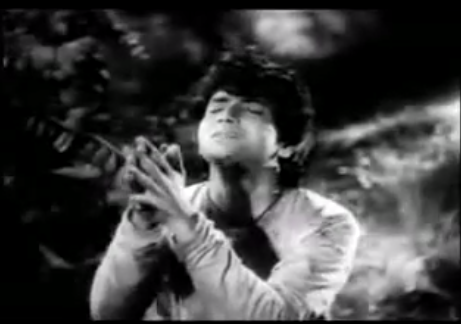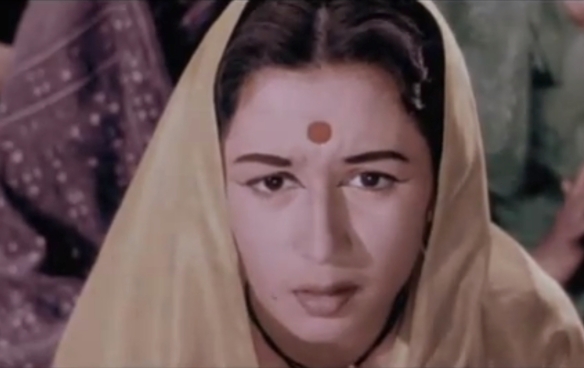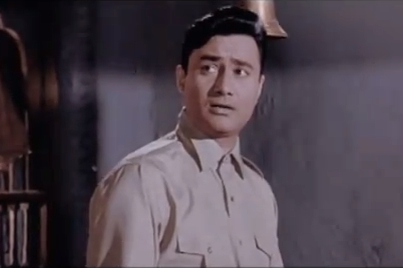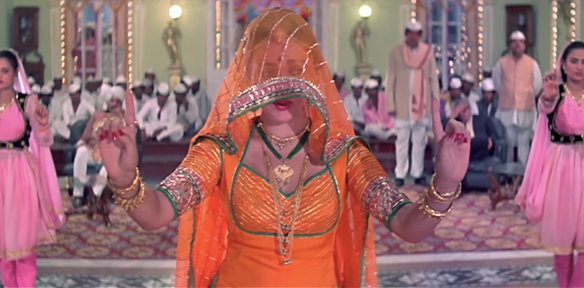
Mandakini made her controversial debut as the heroine in Ram Teri Ganga Maili Ho Gayi (1985).
Today, we present the lyrics and English translation to ek radhaa ek miiraa from Ram Teri Ganga Maili Ho Gayi (1985), the last film directed by the legendary actor-director Raj Kapoor.
Ram Teri Ganga Maili Ho Gayi served as the debut for actress Mandakini, who was featured in two controversial scenes that raised eyebrows at the time of the film’s release. In true Raj Kapoor fashion, one of these scenes depicts a scantily clad Mandakini under a waterfall in a transparent white sari. Given all of the recent controversy over Sanjay Leela Bhansali’s Padmavat (2018), it makes you wonder what Raj Kapoor had to do to get such a scene approved by the Censor Board?
In this film, the River Ganges serves as a metaphor for the corruption of Indian society, as it flows from the pure heights of the Gangotri Glacier down to the devastatingly polluted banks of Calcutta. When the film’s heroine (naturally named Ganga) makes her journey from Gangotri to Calcutta, her honor is symbolically tainted at every step – by a woman who leads her to a brothel, a priest who attempts to ritually rape her, and a blind man who coerces her into life as a courtesan. In parallel to the pollution of the River Ganges, Ganga’s innocence is sullied by behavior that reflects the darkest facets of human nature.
The film’s soundtrack composed by Ravindra Jain features several hits by Lata Mangeshkar and Suresh Wadkar, but the Raga Kirwani-based ek radhaa ek miiraa is arguably the most memorable song of the group. This song highlights a common trope employed in the realm of Hindi films: the mythological juxtaposition of Lord Krishna’s consort Radha against 16th-century mystic poet Meera Bai. Although both women are known for their utmost devotion to Lord Krishna, the lyrics of this song beautifully capture the nuances that set their feelings apart.
One more song that depicts the Radha versus Meera juxtaposition is another Ravindra Jain favorite shyam terii bansii pukare radhaa naam sung by Arati Mukherjee in Geet Gata Chal (1975).
At the end of the day, we’re dying to know one thing: are you #TeamMeera or #TeamRadha? Tell us in the comments!
-Mr. ’55

Born Yasmeen Joseph, she was given the stage name Mandakini by Raj Kapoor for her film debut.
Ek Radha Ek Meera: Lyrics and English Translation
ik raadhaa ik miiraa, dono.n ne shyaam ko chaahaa
Radha and Meera both loved Krishna.
antar kyaa dono.n kii chaaha me.n bolo?
What was the difference in their love?
ik prem divaanii, ik daras diivaanii
One desired his love, the other desired his glance.
raadhaa ne madhuban me.n DhuunDaa
Radha searched for Krishna in the honey gardens,
miiraa ne man me.n paayaa
while Meera found him in her heart.
raadhaa jise kho baiThii voh govind
When Radha lost Krishna,
miira haath bik aaya
he fell into Meera’s hands.
ik murlii ik paayal, ik paglii ik ghaayal
One flute and an anklet, one madwoman and a wounded lover.
antar kyaa dono.n kii priit me.n bolo?
What was the difference in their love?
ik suurat lubhaanii, ik muurat lubhaanii
One desired his beautiful face, the other admired his idol.
miira ke prabhuu girdhar naagar, raadhaa ke manmohan
Krishna was Meera’s Lord and Radha’s beloved consort
sa ga ma pa dha, pa dha ma pa re ma ga
ga re sa ni dha re
re ga ma, ga ma pa, ma pa dha, pa dha sa, ni sa re, aa…
miira ke prabhuu girdhar naagar, raadhaa ke manmohan
Krishna was Meera’s Lord and Radha’s beloved consort
raadhaa nit shringaar kare aur miiraa ban gayii jogan
While Radha adorned herself with ornaments, Meera became an ascetic.
ik raanii ik daasii, dono harii prem kii pyaasii
One queen and one maid, both longed for Krishna’s love.
antar kyaa dono.n kii triptii me.n bolo?
What was the difference in their fulfillment?
ik jiit na maane, ik haar na maane
One could not accept victory, the other could not accept defeat.
ik raadhaa ik miiraa dono.n ne shyaam ko chaahaa
Radha and Meera both loved Krishna.
Glossary:
raadhaa: Lord Krishna’s mythological consort; miiraa: 16th-century Hindu mystic poet and devotee of Lord Krishna; shyaam: dark-skinned one, a name for Lord Krishna; antar: difference; daras: glimpse, glance; madhuban: honey garden; khonaa: to lose; govind: a name for Lord Krishna; murlii: flute; paayal: anklet; paglii: madwoman, ghaayal: wounded; suurat: face; lubhaanaa: to desire, admire; muurat: idol; prabhuu: lord; girdhar: one who lifts the mountain, a name for Krishna; manmohan: one who pleases the mind, a name for Lord Krishna; nit: always; shringaar karnaa: to adorn, often with ornaments; jogan: female ascetic; raanii: queen; daasii: maid, slave; harii: a name of Lord Krishna; triptii: fulfillment, satisfaction; jiit: victory; haar: defeat, loss.
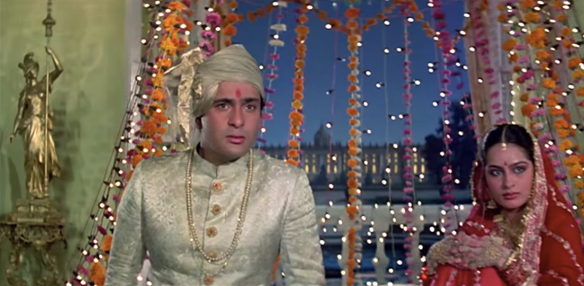
Rajiv Kapoor, Raj Kapoor’s youngest son, stars as the hero who falls in love with Mandakini in Ram Teri Ganga Maili Ho Gayi (1985).

